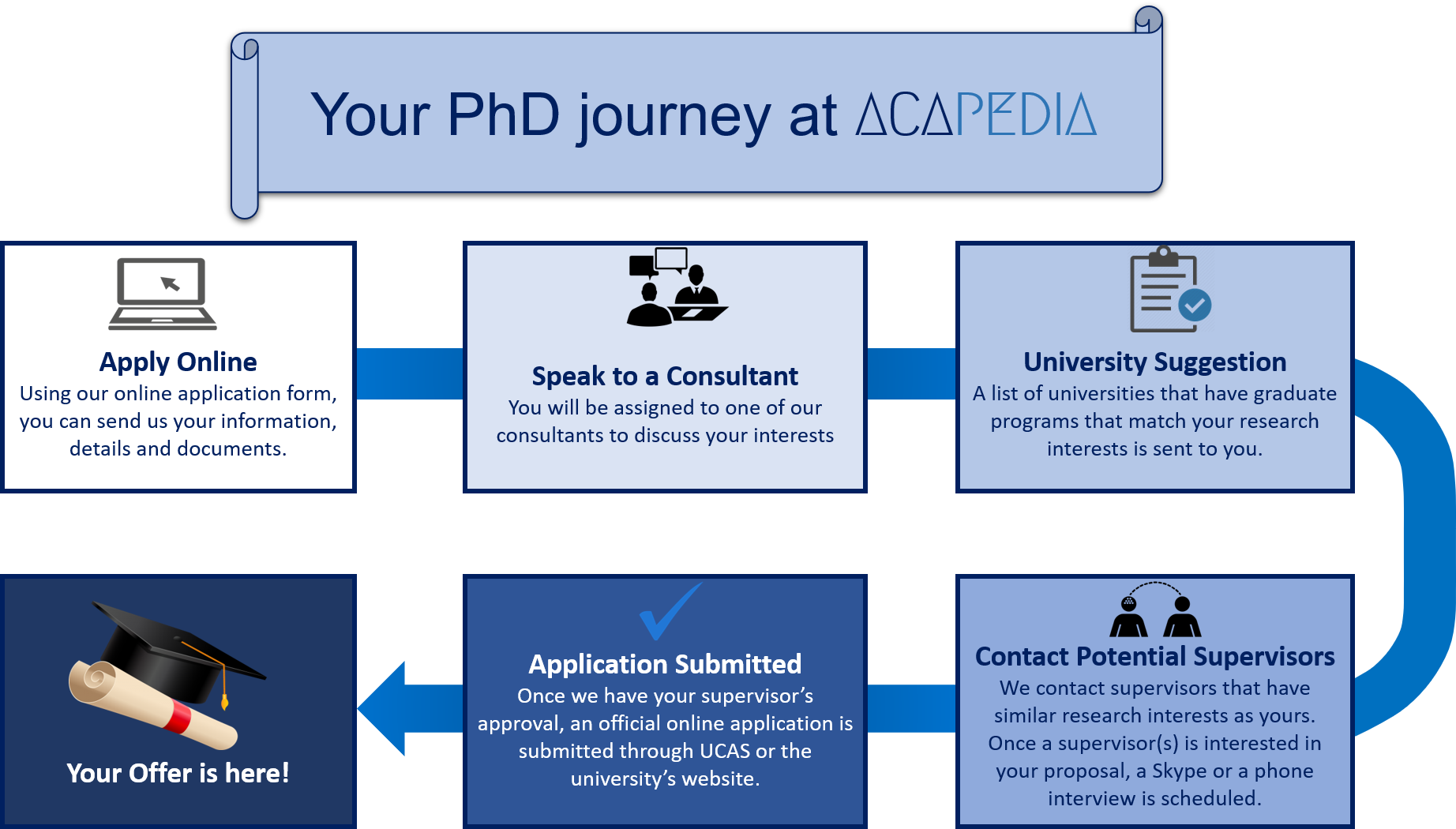PhD
Knowledge is power. Information is liberating. Education is the premise of progress, in every society, in every family.
What is the PhD application process when applying at ACAPEDIA?
Your journey at ACAPEDIA is an exciting and supportive one. This flowchart describes the steps you might expect when you apply here:

What to expect during my PhD?
Starting Out:
This is an exciting time with lots to consider. It is important to:
- Meet with your supervisor and explore our understanding of your PhD.
- Find time to meet other researchers in your field and across the University. Your peers will be invaluable to you throughout your research.
- Find out if your school is running an induction or look at the Welcome events.
- Develop a plan for your PhD and check if it is reasonable with your supervisor(s) and then get organised.
Mid Term Goals:
The middle of your PhD is a time to re-check your plans and review your expectations. It is important to:
- Re-check your PhD plan, are your goals and priorities still appropriate?
- Think about conferences.
- Examine your skills: what courses would help you fully explore your research area?
- Regularly make back-ups of your notes and thesis saving copies to Dropbox, OneDrive, iCloud, external hard drive or USB flash drive.
Final Countdown:
The end of your PhD is in sight. This period is about consolidating your results, writing your thesis and considering your future. It is important to:
- Consider your future plans.
- Make sure your thesis writing ends up at the required deadline.
- Follow the University’s regulations for submission and understand the viva procedure.
- Prepare as much as possible for your viva.
How to write my research proposal?
Your research proposal is one of the important documents you should prepare as part of the application process to secure a doctoral offer at the university. A research proposal is a concise and coherent summary of your proposed research. You should spend some time writing your research proposal as it is essential to help us to match your research interest with an appropriate supervisor.
A typical research proposal:
- Ranges from 1,000 to 3,000 words
- Is judged both on content and proposal format
The research proposal should:
- Clearly define the topic you are interested in and show you understand your research area.
- Include research questions.
- Demonstrate you understand how to conduct research.
- Look professional – it should be typed, in good English, well-structured with suitable headings.
Your research proposal should contain:
-
Title
-
Abstract
In the abstract you need to clarify and state the problem that you want to examine or the central question that wish to address.
-
Research Overview (Introduction)
A well-written introduction is the most efficient way to hook your reader and set the context of your proposed research. An introduction should include a review of relevant literature and theories relating to your proposed research area with summarising the current state of knowledge and recent debates on the topic.
-
Objectives and Questions
Your research proposal should state clearly your research objectives and what is (are) the main question(s) that you want to answer at the end of your research. Your question(s) needs to be answerable within a set timeframe.
-
Methodology
Present all research methods you intend to use throughout your research, e.g., techniques, sample size, equipment, data analysis, species choices, and explain why it is the most appropriate methodology to effectively answer the research questions.
-
Significance of Research
Discuss if your research will make an original contribution within your subject area.
-
Bibliography
Acknowledge ALL books, articles, journal papers, websites and all relevant references that you used to write your proposal.
You can still make changes to your research proposal once you have been accepted for a research degree, however as it is the foundation of your working relationship with your supervisor, it cannot be radically altered without discussion and consultation.
What to expect after completing my PhD
Although this is an early question to ask yourself when applying to your doctoral program, but it is very important to know what your PhD certificate after nearly four years of working hard on your research would benefit you personally and professionally.
Less than 2% of the population has a PhD and you will be one of them after completing your degree. You will be one of the highly educated, information-creating and valuable people. Lots of opportunities out there are waiting to have you!
Academia:
If you plan to stay in academia, then doing a postdoctoral researcher is a straightforward option. During your postdoc position, you devote 100% of your time to research and therefore are able to submit more journal articles and more grant applications. Usually, postdoc positions are temporary, e.g., contract employment, so you need to apply for funding before your postdoc finishes so you can secure the next one.
Industry:
PhDs have many skills that are immediately transferrable to industry, e.g., project management, problem-solving and analytical thinking. PhDs are the driving force behind the economy and PhDs have greater international mobility than other highly educated people. Usually, industry positions are permanent so you don’t need to worry about your employment time limits.
Teaching in schools:
Albert Einstein once said, "If you can't explain it simply, you don't understand it well enough". Being a school teacher is a great opportunity for PhDs to transfer scientific facts in a simple, accurate and clear way so the students absorb the information plainly and comprehensibly. Young students are always curious about science and knowledge and they usually ask very interesting and smart questions and this surely deepens your knowledge and understanding of science as a PhD and helps you revisit concepts through the minds of others.